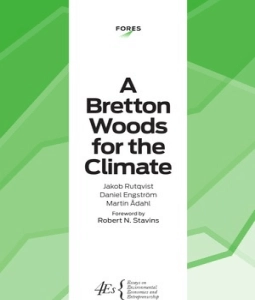

A Bretton Woods for the ClimateUpplaga 2
- Upplaga: 2a upplagan
- Utgiven: 2010
- ISBN: 9789197853286
- Sidor: 211 st
- Förlag: Fores
- Format: Häftad
- Språk: Engelska
Om boken
Åtkomstkoder och digitalt tilläggsmaterial garanteras inte med begagnade böcker
Mer om A Bretton Woods for the Climate (2010)
I september 2010 släpptes boken A Bretton Woods for the Climate skriven av Martin Ådahl, Jakob Rutqvist, Daniel Engström. Det är den 2a upplagan av kursboken. Den är skriven på engelska och består av 211 sidor djupgående information om miljövård. Förlaget bakom boken är Fores.
Köp boken A Bretton Woods for the Climate på Studentapan och spara pengar.
Tillhör kategorierna
Referera till A Bretton Woods for the Climate (Upplaga 2)
Harvard
Oxford
APA
Vancouver



















